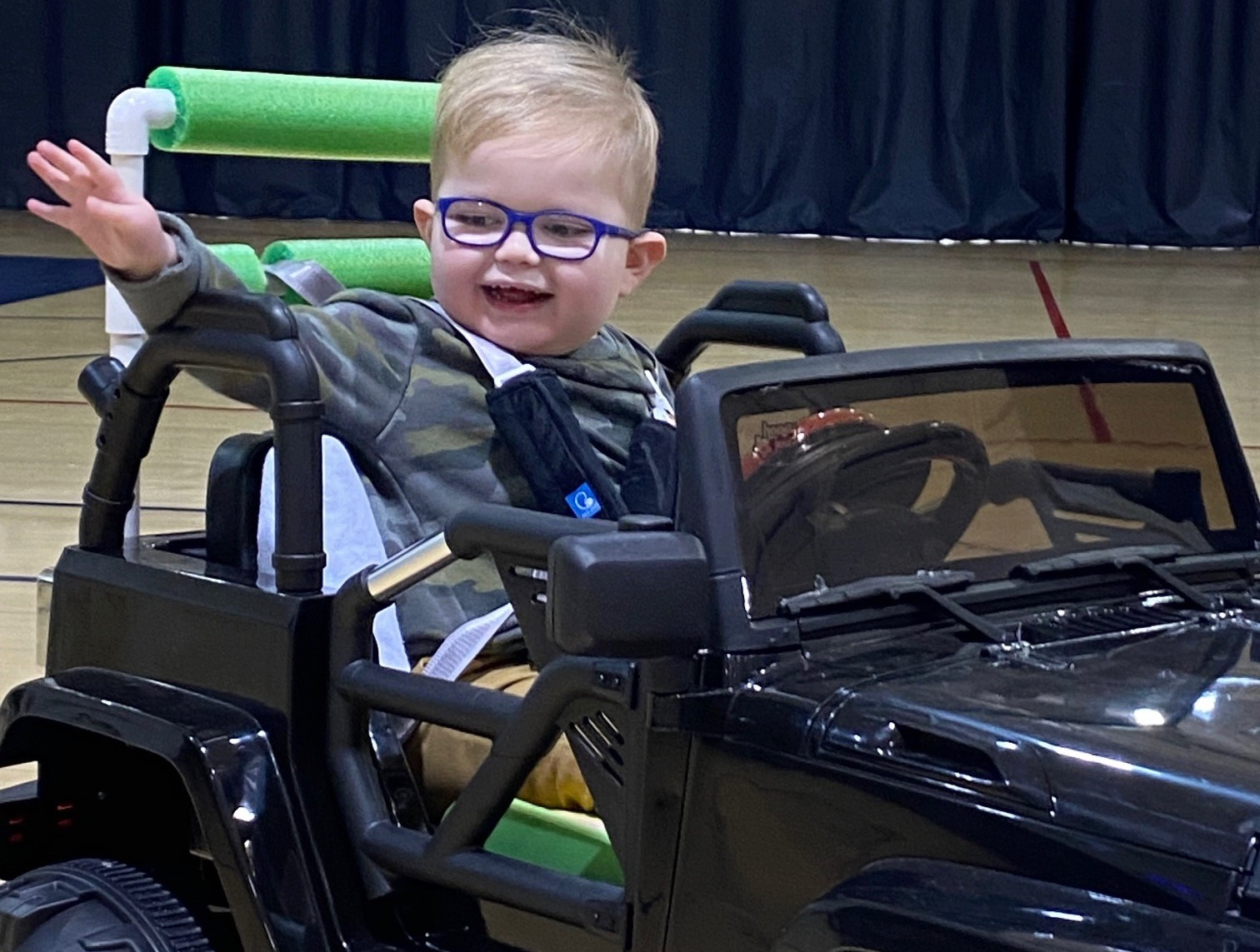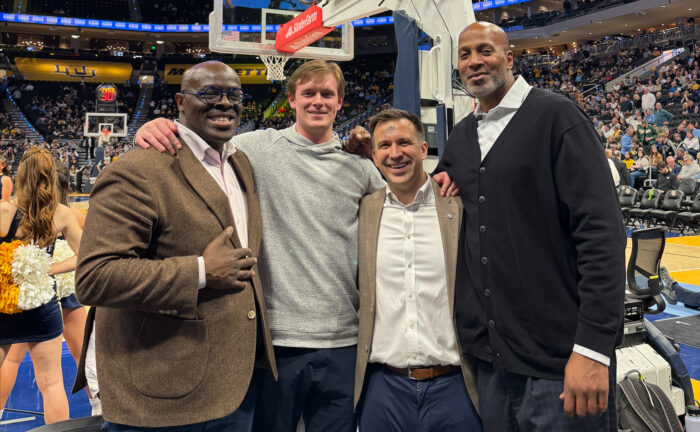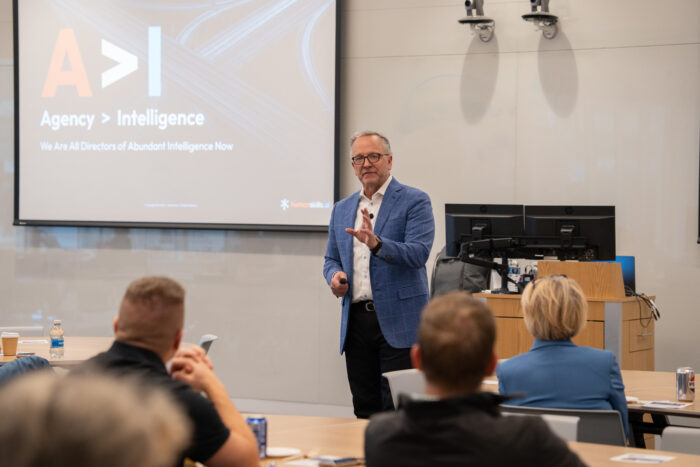By Monica MacKay, director of university communication in the Office of Marketing and Communication
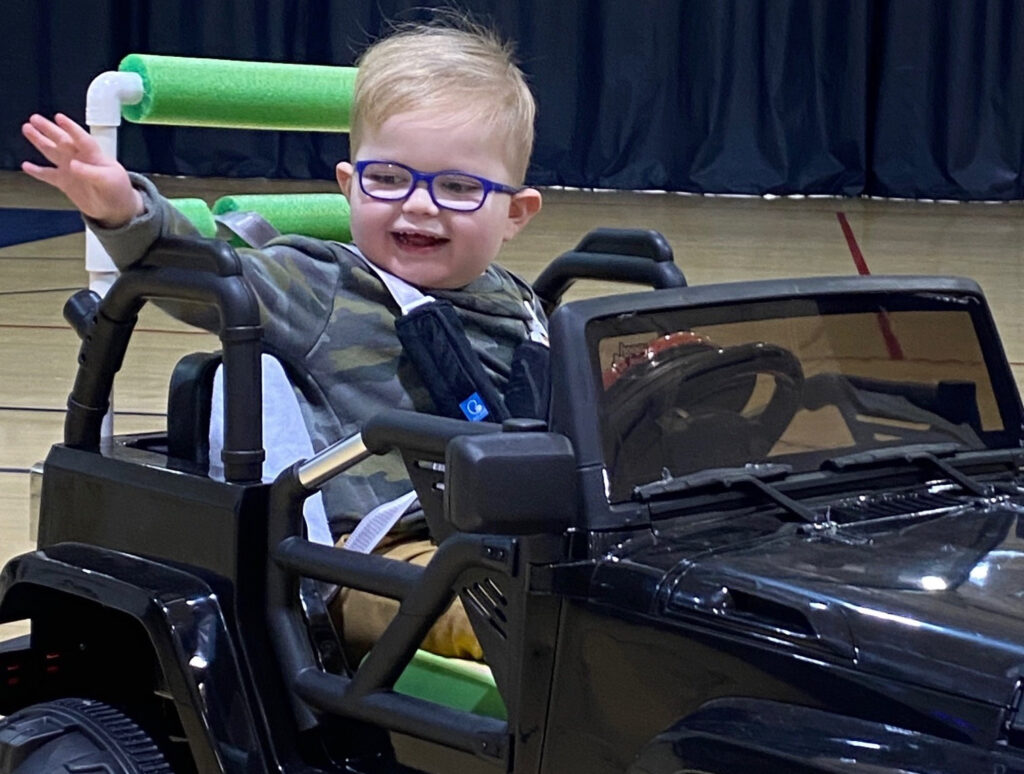
In a striped half-zip fleece and khaki pants, 3-year-old Eli Kuehl sits on the gym floor with his mother, Meghan, on a Saturday afternoon at the Helfaer Tennis and Recreation Center. With a green pacifier in his mouth, he bounces and wiggles impatiently as she searches a diaper bag for a snack.
Nearby, Eli’s father, Nate, checks the battery level on a motorized black Jeep made for children. But this Jeep sports a few special modifications — a pair of padded white bars behind the driver seat, a modified remote control and a big red push button in the middle of the steering wheel.
The Kuehls are part of Go Baby Go! Milwaukee, a partnership between Children’s Wisconsin and the Marquette University and Medical College of Wisconsin Joint Department of Biomedical Engineering. The program is dedicated to helping kids with special needs gain more independent mobility with the use of custom motorized cars — free to all participating families.
This month, the program reached a new milestone: It donated its 200th customized vehicle.
‘Our heart and our life’
In 2019 when Eli was a baby, Meghan and Nate noticed he repeated a very slight jerking motion, almost like a tic; his eyes would roll back. Like typical first-time parents, the Kuehls weren’t sure if it was one of many newborn mannerisms or short-lived behaviors that babies outgrow as they develop.
“Eli is our first-born and our heart and our life,” Meghan says. “Most people wouldn’t even notice his symptoms.”
As these events grew increasingly frequent, the Kuehls contacted their pediatrician at Children’s Wisconsin, and through their care team, Eli was diagnosed with infantile spasms, a rare form of epilepsy that’s usually difficult to diagnose due to the subtlety of symptoms. Often, epilepsy is the underlying condition of infantile spasms.
“We are so lucky we were able to get him diagnosed early. Most don’t find out until after a year old,” Meghan says.
Meghan explains that when infantile spasms go undiagnosed without treatment, brain cells are killed with each seizure, which can have serious consequences. Because Eli is receiving treatment, the Kuehls can focus on treating his epilepsy now. Although epilepsy impacts Eli’s learning and development, his seizures are not as dangerous because he isn’t losing oxygen or consciousness.
Now a toddler, Eli can’t walk or speak yet, but he loves to move and shows an eagerness to connect with others.
“We’re trying to find more ways to give him a dynamic environment, because we can tell he wants to engage in his atmosphere but doesn’t know how,” Meghan says. “We want him to feel involved with his peers.”
Through their Wisconsin Birth to 3 Program therapist, the Kuehls learned about Go Baby Go! Milwaukee and were encouraged to apply. Any family can apply to Go Baby Go! Milwaukee for a child between 9 months and 5 years old. The child does not have to be a patient of Children’s Wisconsin.
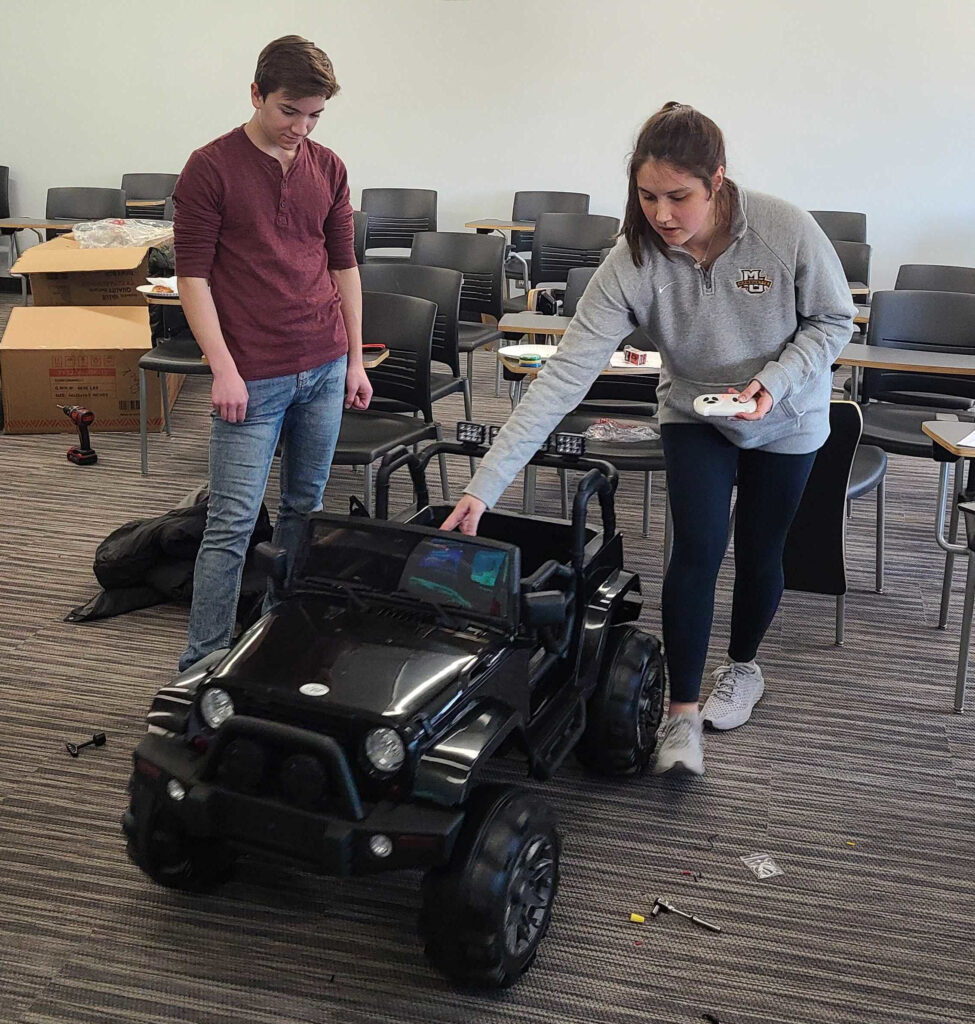
Expanding program to include engineering and health sciences students
Go Baby Go! Milwaukee involves a team of physical and occupational therapists from Children’s Wisconsin who work with engineers from Marquette to select children’s cars and determine the right customizations to support each child’s specific mobility needs.
Molly Erickson is a research engineer in the Marquette University and Medical College of Wisconsin Orthopaedic & Rehabilitation Engineering Center, which is directed by Dr. Gerald Harris. Erickson has managed the Go Baby Go! Milwaukee program since June 2020. Occupational therapist Allison Friel and physical therapist Elizabeth Conrath, a Marquette alumna, are the lead clinicians from Children’s Wisconsin.
“Go Baby Go! Milwaukee is a special program to us. As engineers, it’s nice to see end-users. Many times, in engineering you know you’re designing for someone out there, but never get to meet them,” Erickson says. “This is personal.”
Erickson used to modify all Go Baby Go! Milwaukee cars herself, but in September 2021, she began including Opus College of Engineering students in a monthly build day to help wire the cars and make mechanical modifications based on input from the Children’s Wisconsin team. Erickson checks every car thoroughly for quality control. In addition to the build days, engineering students are involved in the fitting days to gain a better understanding of the modifications needed for each Go Baby Go! Milwaukee car and the opportunity to meet families.
“Including engineering students has been insightful because I realized we needed to dedicate time to hands-on skills training,” Erickson says. “Depending on what they’re studying, students have varying levels of experience, so we use these training days to focus on stripping wires, drilling holes or using a rivet gun so they have base knowledge to use as they support Go Baby Go! Milwaukee.”
In addition to engineering students, Marquette physical and occupational therapy students are also now getting hands-on observation experience from Friel and Conrath.
“Lighting sparks within students is definitely something that fills our tank!” Friel says enthusiastically. “We use each fitting as a teachable moment for these occupational therapy and physical therapy students. We explain what modifications we are recommending and why based on the child’s presentation and skills.”
Marquette offers indoor winter driving practice
Eli received his car in December 2021, but he didn’t take to it right away. For many Go Baby Go! Milwaukee participants, it can take practice to understand how to manipulate their vehicles. In the cold winter weather, it can be challenging for parents to have opportunities to use the car outside, and having to bundle up children can make driving more restrictive.
This year, the university began offering Go Baby Go! Milwaukee families indoor gym space on campus during the weekends from November through mid-April. That will resume in October as the weather turns in the fall.
The Kuehls started bringing Eli to campus this winter to give him more chances to practice with his Jeep. Not only does it provide space to drive, but the lights, noises and motion of other people provide the kind of environment Eli enjoys.
As Meghan and Nate buckle Eli into his Jeep, he almost immediately relaxes. Meghan helps him remember how to place his arm. Eli’s Jeep will move if an arm or hand is on the big red button in the middle of the steering wheel. The vehicle shifts forward, and Eli looks up and around him, attentive to all lights and sounds as he drives along.
Eli’s parents control the speed and direction with the remote control.
“The fact that he keeps his arm outstretched for a long time is awesome,” Nate says, noting how Eli was connecting his movement with what the car could do for him.
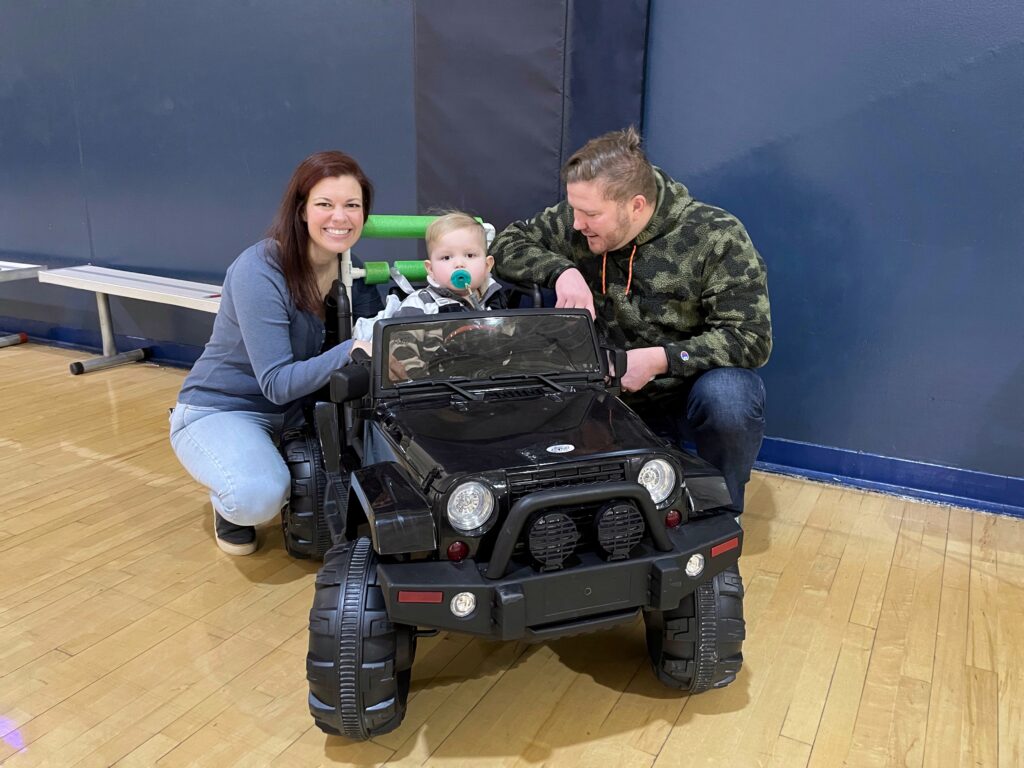
200 cars and growing
With the 200th car donated, the Go Baby Go! Milwaukee team has big aspirations for how the program is poised to grow faster.
“Since we began dreaming about bringing this program to Milwaukee in 2014, we have wanted to open it up to the larger southeastern Wisconsin community. We have applications rolling in constantly,” Conrath says. “We are just thrilled to be able to provide some increased independence and fun for these children with special needs and their families.”
Erickson notes that last year was the busiest yet, with 70 cars modified and donated.
The Kuehls continue working with their care providers to try to control Eli’s seizures. No medication has been successful yet, but they’re seeing positive results in response to a ketogenic diet. Fortunately, Eli’s development is not regressing. Meghan and Nate are hopeful Eli will be able to grow with the car and enjoy the mobility to interact and observe more in his world.
As Nate brakes the car to do a Y-turn, Eli cries out in apparent annoyance until Nate gets him driving at an acceptable speed again. Meghan laughs and takes a few photos.
“We wanted to share our story in case it’s potentially beneficial to another family experiencing something similar,” Meghan says. “We never would’ve known about this program if it weren’t for our therapist.”
Supporting Go Baby Go! Milwaukee
Are you interested in sponsoring a car or helping Go Baby Go! Milwaukee purchase supplies? Please learn more about ways to donate.
